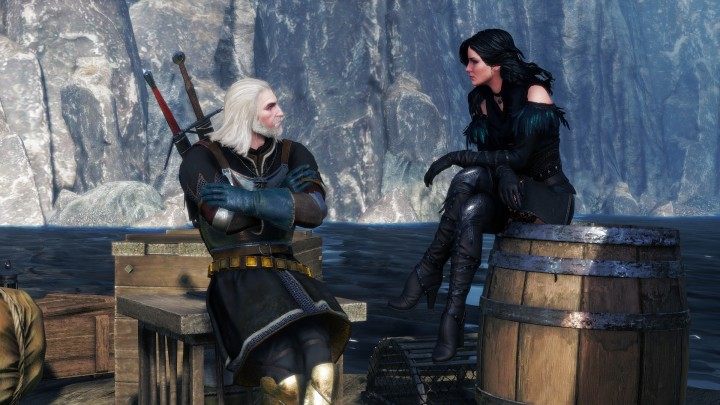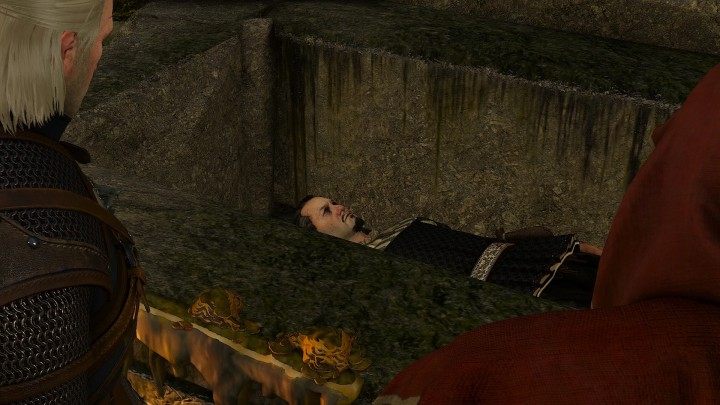Computer versus meat grinder. Who is Andrzej Sapkowski? The Best Quotes from the Ultimate Game Master

- Who is Andrzej Sapkowski? The Best Quotes from the Ultimate Game Master
- The Witcher – a thorn in the side of the author
- Computer versus meat grinder
- Modesty – a cured disease
- Pride (of the writer) and Prejudice (of anti-fans?)
- Defender of readers, guardian of fantasy lovers
- Darker (more colorful?) shades of Andrzej Sapkowski
Computer versus meat grinder
In general, AS is a more modern man than you might think. He writes books on his PC and extracts historical sources both from libraries and from the depths of the Internet. In a fervent defense of the latter, combined with a picturesque attack on TV – he once appeared in a show where he gave an extended interview to Stanislaw Beres:
(...) television is stupid, and the system of its control – I emphasize: control! – feeds us not only kitsch and falsehoods, but also stupidity and incompetence. There's nothing we can do about it. We're powerless. On the other hand, the Internet is a place where we rule. We hold the helm and control the ship, we are the customer and the owner at the same time. We choose what we want, we draw from these reservoirs from which we have a need, a desire or a wish – and there is an endless number of these pools. On TV, especially on Polish TV, I'm forced to watch things because I have no other choice, the effects of productions made by slanderous graphomaniacs and performances of jesters, exhibitionists, morons and psychopaths. Or I have to watch piteous politicians who gracefully combine all of the features mentioned above. However, on the Internet, I have a choice. I admit that you're right – Internet has a shell of dirty and filthy lava, but I spit on it and descend to the depths. To the full riches of the vault.
You see the booklet entitled Horror Anal Sex lying next to the Book of Henrykow, and you’re stunned, outraged, or baffled. I'm passing Sex indifferently, without as much as a blink of an eye; I'm skipping blogs or graphomaniac shows and sites for the illiterates. And I return to the search for old German texts by Walter von der Vogelweide and the old Bohemian chronicles of Vavrinec of Brzezove. Because I can't find them anywhere other than the Internet.
History and Fantasy, 2005
AS gained this belief in the previous century:
(...) I recently believe that any complaining about progress in general, and about the Internet in particular, is a whining of an old geezer who envies young people canned peas, because he didn't have such products and had to manually shell pea pods in his youth.
Interview with Onet.pl, 1999

Other statements also reveal an image of a man who didn't freeze himself in the era of manuscripts or typewriters:
What books would you take to the proverbial deserted island?
AS: All of them. And the rest on CD-ROMs.
Interview with Ultramaryna, 2001
What can we wish to a writer? Break a pen? (conventional Polish phrase; sort of like ‘Break a leg!’ – ed. note)
AS: Generally, I would prefer not to break anything, and moreover, the word 'break' evokes ambiguous context. Besides, I don't write with a pen, I use a computer. Therefore, my most common wish, spoken out loud during my work, is 'Go to hell, Microsoft Corporation!' I would be happy to accept such a wish even if it's completely unrealistic.
Interview with the 'G Crew', 2002

However, Andrzej Sapkowski's acknowledgement of the technological progress ends where the Earth's atmosphere turns into vacuum:
Fan: When do you think man shall stand on Mars? Do you have any doubts about the fact that the man set foot on the moon, or at least during the Apollo XI mission?
AS: I have no idea. But I think that people won't have anything to do on Mars. There are many places on Earth that are worth visiting and where you can do reasonable things.
Online chat during the promotion of the Spanish edition of The Last Wish, 2002
We spend a lot of money on space exploration and we do it completely pointlessly because there is nothing out there in space. The expeditions of Columbus voyaged to find pepper, herbs, and gold. However, we will not find anything like that in space. Even if we do, the costs of delivering these goods will be overwhelming. Throwing money away for space exploration is pure nonsense. We might as well drown them in soldered containers in the ocean.
History and Fantasy, 2005
If one sought easy answers, these views could explain the writer's peculiar reluctance to science fiction. Maybe not to the whole genre, because Sapkowski mentions names such as Lem, Asimov or Zajdel with respect, but at least to certain behaviors which are supposed to be common among writers representing this type of literature:
Due to the so-called 'serious criticism,' the SF as a genre is not being noticed at all, it's relatively treated with disregard or, at best, with a dose of protectionism – it suffers so much that in order to feel better and relieve its nerves, it must, like a rabbit from La Fontaine, find a frog that it could chase. Usually treated as 'nonsense about UFOs and aliens,' SF has found a way to add value to itself: a frog, i.e. fantasy. There's someone to frown upon and look down on the nonsense of swords and magic. Called a ghetto by the mainstream, SF has found a sub-ghetto. Which plays the role of a soothing placebo for the main ghetto.
Sapkowski has written more on this issue in the book called The Manuscript Found in the Dragon's Cave. A Compendium of Knowledge on Fantasy Literature. Besides, it seems he doesn't have anything against SF:
Fan: What do you think of hard Sci-Fi?
AS: Personally, I like this genre, but I can't write it and I won't even try to. The only machine I know a little bit about, how it actually works, is a meat grinder, so I can't embarrass myself in front of the readers...
Online chat during the promotion of the Spanish edition of The Last Wish, 2002

At this particular moment, I have to intervene and clarify that it is not true that AS never wrote science fiction. He has written one story of this genre:
Battle dust is a part of a larger whole, so are there any chances that it will appear as a novel?
AS: Battle Dust was a joke made by the Gdansk Fantasy Club. The joke was supposed to be: 'Jesus Christ, Sapkowski’s writing a sci-fi space opera, we have an exclusive fragment!' I have friendly relations with the GKF, so I went with it. It was a few years ago, when I was still a jokester. As a prank, Battle Dust did an excellent job, numerous questions about the continuation are the greatest proof. There won't be any continuation, of course.
1996/97, interview with Sapkowski Zone




